Related Research Articles
Fantasy comedy or comic fantasy is a subgenre of fantasy that is primarily humorous in intent and tone. Typically set in imaginary worlds, fantasy comedy often involves puns on, and parodies of, other works of fantasy.
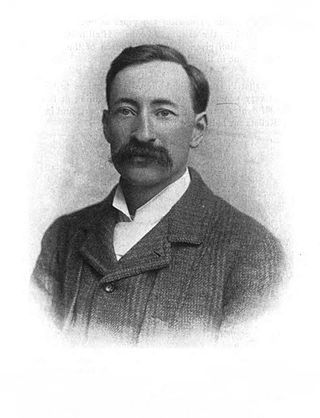
Eden Phillpotts was an English author, poet and dramatist. He was born in Mount Abu, India, was educated in Plymouth, Devon, and worked as an insurance officer for ten years before studying for the stage and eventually becoming a writer.

James Branch Cabell was an American author of fantasy fiction and belles-lettres. Cabell was well-regarded by his contemporaries, including H. L. Mencken, Edmund Wilson, and Sinclair Lewis. His works were considered escapist and fit well in the culture of the 1920s, when they were most popular. For Cabell, veracity was "the one unpardonable sin, not merely against art, but against human welfare."

Arthur Machen was the pen-name of Arthur Llewellyn Jones, a Welsh author and mystic of the 1890s and early 20th century. He is best known for his influential supernatural, fantasy, and horror fiction. His novella The Great God Pan has garnered a reputation as a classic of horror, with Stephen King describing it as "Maybe the best [horror story] in the English language." He is also well known for "The Bowmen", a short story that was widely read as fact, creating the legend of the Angels of Mons.

John Holbrook Vance was an American mystery, fantasy, and science fiction writer. Though most of his work has been published under the name Jack Vance, he also wrote several mystery novels under pen names, including Ellery Queen.
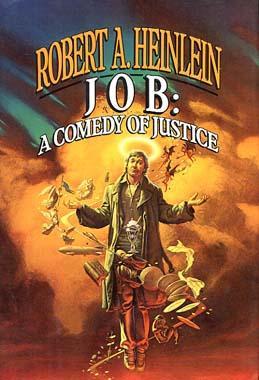
Job: A Comedy of Justice is a science fiction novel by American writer Robert A. Heinlein published in 1984. The title is a reference to the biblical Book of Job and James Branch Cabell's book Jurgen, A Comedy of Justice. It won the Locus Award for Best Fantasy Novel in 1985 and was nominated for the Nebula Award for Best Novel in 1984, and the Hugo Award for Best Novel in 1985.

Michael Swanwick is an American fantasy and science fiction author who began publishing in the early 1980s.

Linwood Vrooman Carter was an American author of science fiction and fantasy, as well as an editor, poet and critic. He usually wrote as Lin Carter; known pseudonyms include H. P. Lowcraft and Grail Undwin. He is best known for his work in the 1970s as editor of the Ballantine Adult Fantasy series, which introduced readers to many overlooked classics of the fantasy genre.

Figures of Earth: A Comedy of Appearances (1921) is a fantasy novel or ironic romance by James Branch Cabell, set in the imaginary French province of Poictesme during the first half of the 13th century. The book follows the earthly career of Dom Manuel the Redeemer from his origins as a swineherd, through his elevation to the rank of Count of Poictesme, to his death. It forms the second volume of Cabell's gigantic Biography of the Life of Manuel.
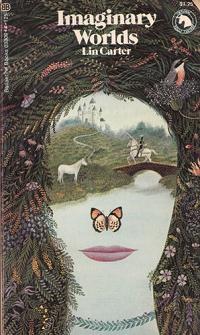
The Ballantine Adult Fantasy series was an imprint of American publisher Ballantine Books. Launched in 1969, the series reissued a number of works of fantasy literature which were out of print or dispersed in back issues of pulp magazines, in cheap paperback form—including works by authors such as James Branch Cabell, Lord Dunsany, Ernest Bramah, Hope Mirrlees, and William Morris. The series lasted until 1974.
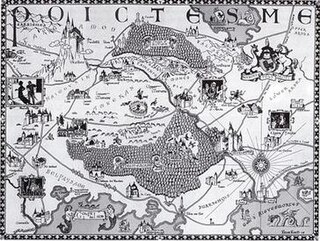
Poictesme is a fictional country or province which forms the setting of the fantasy works of James Branch Cabell, known collectively as Biography of the Life of Manuel. Poictesme is ruled by the Count Dom Manuel.

Jurgen: A Comedy of Justice is a fantasy novel by American writer James Branch Cabell, which gained fame shortly after its publication in 1919. It is a humorous romp through a medieval cosmos, including a send-up of Arthurian legend, and excursions to Heaven and Hell as in The Divine Comedy. Cabell's work is recognized as a landmark in the creation of the comic fantasy novel, influencing Terry Pratchett and many others.

Realms of Wizardry: An Anthology of Adult Fantasy is an American anthology of fantasy stories, edited by American writer Lin Carter. It was first published in hardcover by Doubleday in December 1976 as the second of two such anthologies continuing a series of nine assembled by Carter for the Ballantine Adult Fantasy series.

Imaginary Worlds: the Art of Fantasy is a study of the modern literary fantasy genre written by Lin Carter. It was first published in paperback by Ballantine Books in June, 1973 as the fifty-eighth volume of its Ballantine Adult Fantasy series; it was the only nonfiction entry in the series. The book was among the earliest full-length critical works devoted to fantasy writers and the history of fantasy. It was the third of three such studies by Carter, being preceded by Tolkien: A Look Behind "The Lord of the Rings" (1969) and Lovecraft: A Look Behind the "Cthulhu Mythos" (1972). These works, together with his editorial guidance of the Ballantine Adult Fantasy series, established Carter as an authority on the genre.
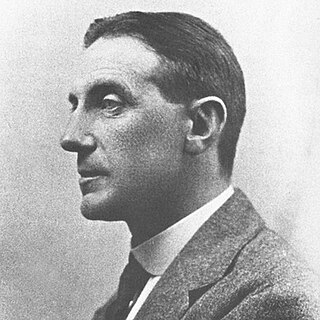
Frank Cheyne Papé, was an English artist and illustrator whose career spanned 64 years, from 1898 to 1962. Papé's work included painting using gouache, water colour, and illustration in pen and ink.
The Silver Stallion: A Comedy of Redemption is a novel by American writer James Branch Cabell that was published in 1926 as part of his Biography of the Life of Manuel series.

The Cream of the Jest : A Comedy of Evasions is a comical and philosophical novel with possible fantasy elements, by James Branch Cabell, published in 1917. Much of it consists of the historical dreams and philosophical reflections of the main character, the famous writer Felix Kennaston. An early reviewer said it was more a series of essays than a novel.

The High Place is a 1923 fantasy novel by James Branch Cabell, first published in hardcover by Robert M. McBride in an edition illustrated by Frank C. Pape. It is the eighth volume in the Storisende edition of Cabell's Biography of the Life of Manuel. The High Place is a satirical sequel to the Sleeping Beauty tales, depicting a marriage where the "happily ever after" coda has gone far awry.

Domnei: A Comedy of Woman-Worship (1913) is a fantasy novel by James Branch Cabell, set in the imaginary French province of Poictesme during the second half of the 13th century.
References
- ↑ Frances Joan Brewer, James Branch Cabell: A Bibliography of his Writings, Biography and Criticism, University of Virginia Press, Charlottesville, 1957